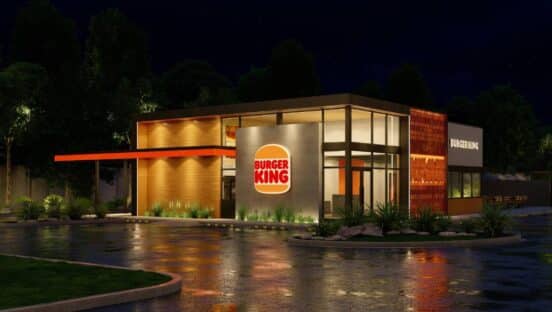Burger King announced Tuesday it will acquire Carrols Restaurant Group—its largest franchisee—for roughly $1 billion. The chain described the transaction as a way to “significantly accelerate” its $400 Reclaim the Flame comeback plan.
Carrols owns 1,022 Burger King stores in 23 states, which earned a combined $1.8 billion in systemwide sales during the 12 months ending September 30. Carrols also operates 60 Popeyes units in six states.
The fast-food giant paid $9.55 per share for the publicly traded Carrols, which represents a 23.1 percent premium of the franchisee’s 30-day average stock price as of January 12. The purchase is expected to close in the second quarter.
“Today’s announcement is a testament to our more than 24,000 Carrols team members who have helped drive the company to record levels of profitability over the past 12 months,” CEO Deborah Derby said in a statement. “These results have allowed us, through this transaction, to deliver immediate and certain value to Carrols shareholders at an attractive premium to the Company’s current and historical share prices. Additionally, we believe our team members will now have additional opportunities as part of the greater RBI family—in our office, in the field and especially in our restaurants, including for long-time managers who may want to become franchisees themselves. We look forward to working closely with Tom [Curtis] and the rest of the Burger King team in the months and years ahead.”
The purchase comes almost a year and a half after Burger King announced its Reclaim the Flame framework, aimed at improving operations, technology, equipment, and franchisee profitability. As the new owner of 1,000-plus restaurants, Burger King will speed up Carrols’ remodeling process. The brand will spend roughly $500 million of capital, funded by Carrols’ operating cashflow, to redesign about 600 stores that are not currently considered modern image.
The plan is for Carrols’ operating team to run restaurants in partnership with Burger King. The franchisor will spend five to seven years refranchising most of the portfolio to new and existing smaller franchisees who live in their local communities. Burger King will keep roughly 200 restaurants for itself.
“Carrols has demonstrated strong and improving restaurant operations over the years, Burger King U.S. and Canada president Tom Curtis said in a statement. “This acquisition is an exciting accelerator to our Reclaim the Flame plan that is focused on relentlessly pursuing a better experience for our Guests. We are going to rapidly remodel these restaurants over the next five years or so and put them back into the hands of motivated, local franchisees to create amazing experiences for our Guests.”
In early January, Carrols reported that Burger King same-store sales rose 7.2 percent in Q4 year-over-year and that Popeyes comps increased 7.6 percent. Derby noted that Burger King’s jump was fueled by a 4.2 percent increase in average check and a 2.9 percent uptick in traffic. For the full year 2023, same-store sales lifted 9.3 percent and 10.1 percent at its Burger King and Popeyes restaurants, respectively. Total restaurant sales increased 8.4 percent to $1.88 billion compared to $1.73 billion in the full year of 2022.
Carrols is responsible for debuting Sizzle, Burger King’s new prototype, which opened last fall in Marion, North Carolina. Another came in Bennington, Vermont. The updated store design features digital-forward aspects like kiosks and mobile order and pickup inside the store as well as at the drive-thru. The Marion restaurant touts 40 seats. More generally, operators can select 40, 60, or 80-seat Sizzle boxes depending on market need. But it’s going to cut about 200 square feet from traditional builds.
Derby said in November that Carrols hoped to bring kiosks to 250 or so restaurants in the next few months, with most of it funded by Burger King’s Reclaim the Flame strategy.
Carrols has operated Burger King stores since 1976 and Popeyes units since 2019. Derby was named CEO a few months following the unexpected passing of former leader Paulo Pena on New Year’s Eve in 2022.









